Many websites and apps, especially online shopping platforms, require personal information, including phone numbers. Unfortunately, some platforms share or sell this data to third parties, including telemarketers and fraudsters. As a result, you may start receiving calls from unknown numbers. While an occasional missed call is normal, frequent calls from unknown sources can quickly become annoying. The worst thing? Many of these calls are from scammers trying to steal your personal information or money.
According to the Federal Trade Commission, people lose a lot of money to phone scams. While some scams may act friendly, others threaten or try to scare their victims. They will do their best to successfully use all their tactics to deceive their victims and steal their identity data or savings.
Regardless of whether it is a grandparent, romance, government impersonation, tech support, or financial scam, to list a few, you must know how to detect it as well as how to check if a phone number is real. The best way to do this? Be careful, check twice, and use a scammer phone number lookup service.
Common Signs of a Scam Phone Number
You receive a phone call from a suspicious number, and the question “Is this a spam phone number?” pops up in your head. Well, it is easy to check if you know what tactics to use. So, how to check if a phone number is real? And how to tell if someone is scamming you online?
1. Creating Urgency or High-Pressure Tactics
High-pressure tactics and urgency are classic red flags when dealing with potential scam phone numbers. Scammers use these methods to make you act quickly before you have time to think critically.
Here’s how it works:
- Scammers can call and tell you that your bank account is compromised, your identity was stolen, or you face legal action. They will have a well-structured scheme to deceive you and make you take immediate actions that will compromise your sensitive data or lead to money loss.
- They will also use special limited-time offers, like “Do it right now!”
- They can represent themselves as bank representatives, tech support, cell phone carrier agents, or even charities needing urgent donations.
2. Requests for Sensitive Personal or Financial Details
Scammers often pretend to be trusted organizations: banks, government agencies, or tech support to trick you into revealing sensitive information. So, if you receive a call from an unknown phone number and you respond, hear something like “We detected suspicious activity on your account”, “You’ve won!”, “Provide your bank info to receive the money”, “Your bank account is compromised”, or asking you to confirm your credit card details, stay aside. Better to end the call immediately and contact your bank directly to clarify whether the information is fake or real. As a rule, such calls are often phone scams.
3. Calls from Unfamiliar or Foreign Numbers
Scammers often use unknown, spoofed, or international numbers to trick people into answering. These calls may result in financial loss or security risks. Therefore, be cautious if you receive a call from a number that appears to be local but has an international prefix.
Here is some information you should be aware of:
- Calls from countries you don’t recognize (e.g., +92, +234, +63) could be scam attempts.
- You can receive automated robocalls – calls pretending to be from your bank, government, or tech support.
- You can get a short missed incoming call, a call phone, or a phone that rings and then hangs up, prompting you to call back an expensive number. So, never call back suspicious phone numbers you do not know.
Note: If a caller refuses to verify their identity, that’s a major red flag! Stay alert.
4. Too-Good-to-Be-True Offers or Prizes
If you receive a call saying you’ve won a lottery, sweepstakes, or expensive prize you never entered, it’s likely a scam. Scammers use these tactics to lure victims into providing personal information or making upfront payments. As a rule, people participating in different giveaways or actions are frequently victims of such fraudulent schemes. So, if you have got such a call but have never participated in any giveaway, action, or lottery, or even if you have, it is better not to provide your personal data to the caller. If you didn’t sign up for anything, how could you win?
5. Unverified Caller IDs or Business Information
If the phone number on your screen doesn’t match the caller’s claimed identity, such as a major company using a local or unfamiliar number, it could be a sign of caller ID spoofing, a common scam tactic.
Scammers often use this technique to impersonate trusted organizations, tricking you into answering their calls. So, be cautious if the caller pressures you for personal information, requests immediate payments, or threatens legal action. Therefore, to avoid scam calls and verify its legitimacy, hang up and contact the company directly using the official phone number from their website.
For extra peace of mind, you can quickly check the number with a reliable reverse phone lookup tool like GEOfinder. In just a few seconds, you’ll get key details:
- Caller’s name
- Address
- Social media
- Web activity
- Location
With GEOfinder, you’ll always stay safe – it’s worth double-checking.
How to Check If a Phone Number Is a Scam?
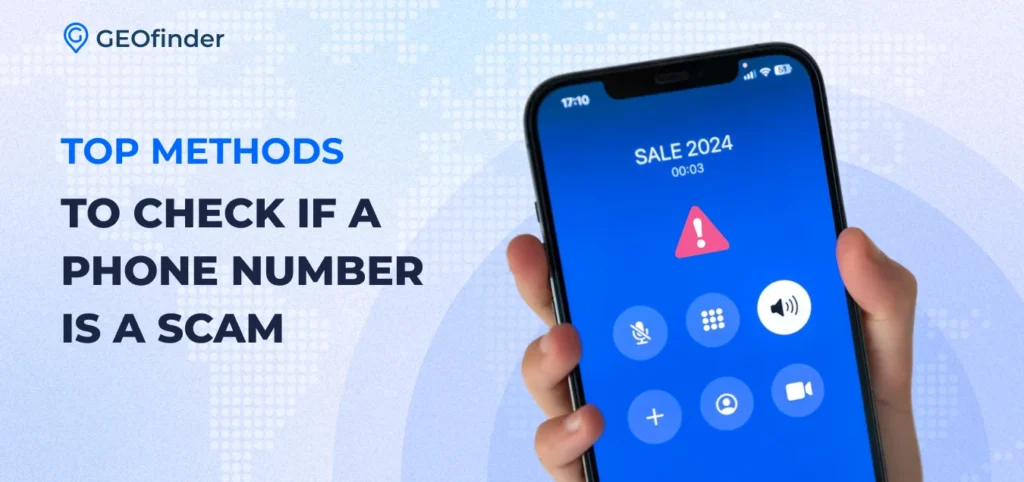
If you see an incoming call from an unfamiliar number, you should know how to check if a phone number is real or a scam. Look for these red flags when you receive a call:
- International area code that looks local
- The number does not match the caller ID name (e.g., it says a big company but has a local number)
- A caller claims they are representatives of the IRS or FBI – they won’t reach out to you by phone out of the blue
- Carrier flags it as “Scam Likely” or “Spam Risk”
- Suspicious requests like asking for credit card confirmation, SSN, bank info, or urgent requests for money because of threats of urgency
- Use scammer phone number lookup services like GEOfinder, Whitepages, or BeenVerified
- Search the number on Facebook, Instagram, or LinkedIn. Cannot find it? Then it may be fake.
- Check with your phone carrier (some carriers offer scam call protection services, like AT&T’s Call Protect or Verizon’s Call Filter).
- How to tell if someone is scamming you online? If you get a message congratulating you with unrealistic prizes or wins, sensitive data loss, etc., and the message has poor grammar – it is a scam.
- Does it seem suspicious? Report and block the number:
– FTC (USA): reportfraud.ftc.gov
– FCC (USA): fcc.gov/robocalls
– National Do Not Call Registry: donotcall.gov
What to Do If You Receive a Scam Call?
Have you already received a spam call and do not know what to do? Firstly, do not panic. In most cases, simply answering a spam call does not bring any negative consequences. However, the info you share with them can put you at risk. The more personal info you share, the higher the risk of identity theft, financial loss, etc.
So, if you receive a scam call, follow these steps to protect yourself:
- If you don’t recognize the number, let it go to voicemail. Scammers often use fake caller IDs to trick you.
- If you accidentally answer, don’t engage. The longer you stay on the line, the more likely they will manipulate you. So, simply end the call and block their number.
- Have you received a call claiming they are a bank, government, or tech support representative? Check it, and don’t share any sensitive info.
- Use reliable scammer phone number lookup services like GEOfinder – it will help you get the info about the caller and filter spam and robocalls. Moreover, you will get detailed info about the caller (the name of the person to whom the number belongs) and their address.
- To avoid any possible negative consequences, if you suspect a scam call, report it immediately to your phone carrier or at reportfraud.ftc.gov (if in the USA).
How to Protect Yourself from Scam Calls
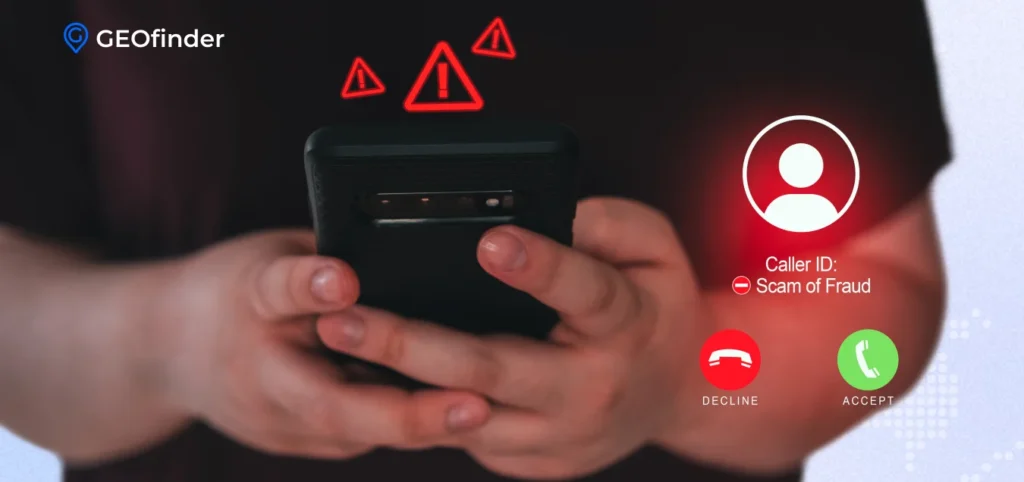
Scammers are getting smarter, but you can stay ahead if you are careful and notice any suspicious signs that may tell you it is a scam call. The other methods to protect yourself from scam calls are to:
- Use scammer phone number lookup (GEOfinder – this tool will help you figure out if it’s a scam and not pick up).
- Do not answer unknown numbers – let them go to voicemail.
- If you suspect something, simply end the call and block the caller.
- Never share personal data.
- Always check twice, even if a caller says they are a government representative.
- Detect high-pressure tactics – it is an obvious sign of a scam call.
- Immediately report scam calls to the FTC.
Conclusion
Scammers use high-pressure tactics, fake identities, and urgent requests to steal personal data. To stay safe, use scammer phone number lookup services like GEOfinder, avoid sharing sensitive info, and block/report suspicious calls. If a call seems off, trust your instincts – legitimate organizations won’t pressure you. Need a tool to get more info about an incoming call? Stay safe with a reliable GEOfinder scam phone number lookup service!


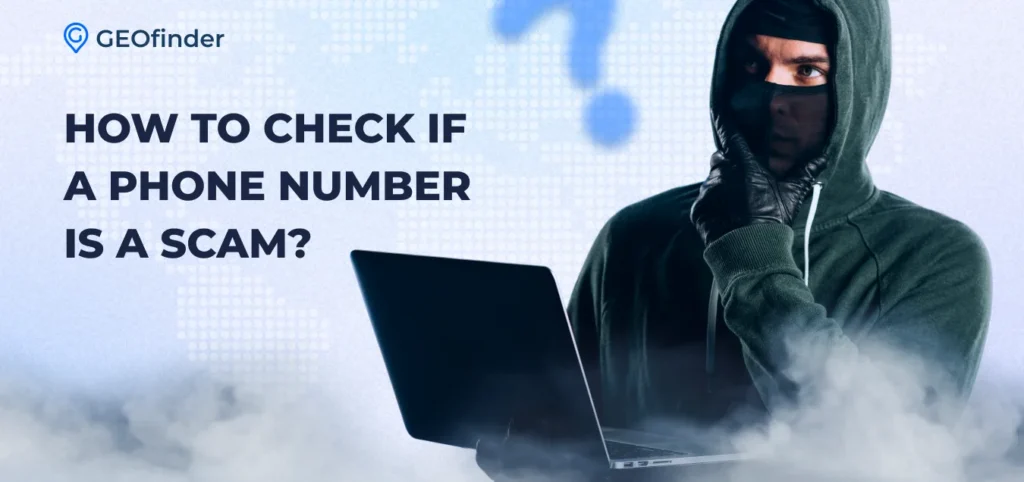
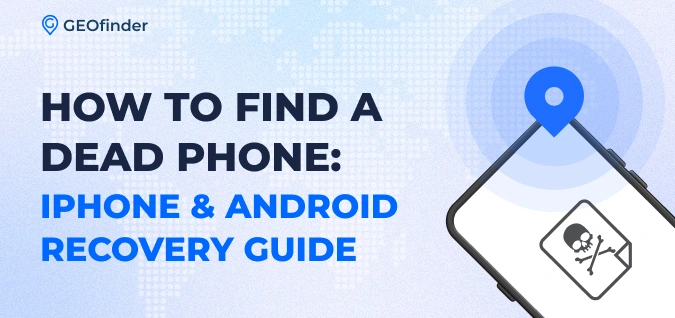
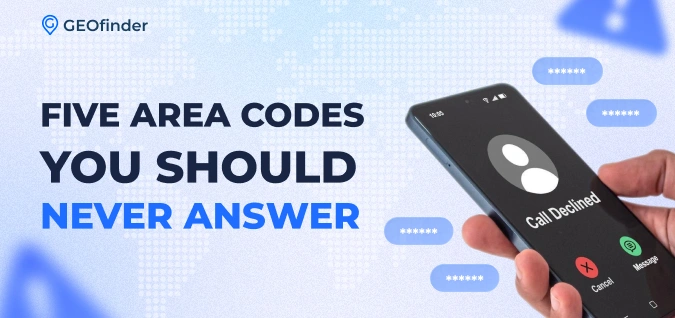
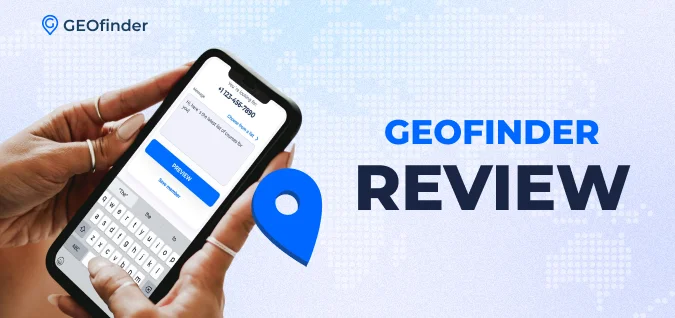
Comments